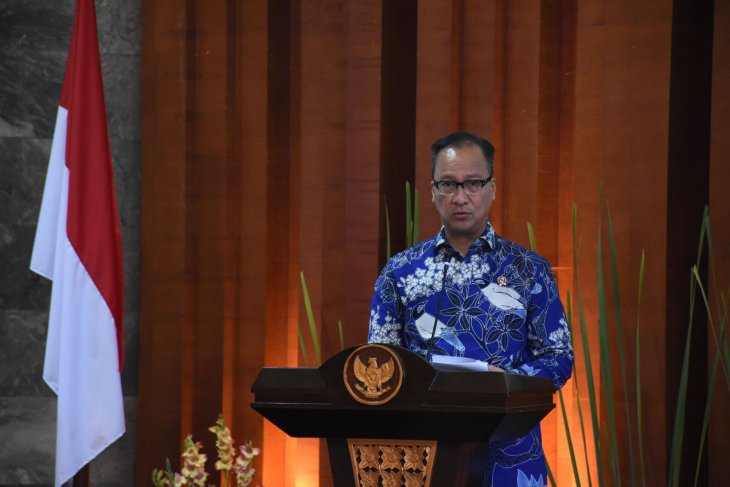Live Streaming
Program Highlight
Company Profile
PMI Increases, Minister Upbeat on Industry Investment Growth
Written by Ani Hasanah
Industry Minister Agus Gumiwang Kartasasmita. (ANTARA)
Industry Minister Agus Gumiwang Kartasasmita is optimistic of Indonesia's industry sector investment growth after the IHS Markit released Indonesia's Manufacturing Purchasing Managers' Index (PMI) at 51.9 on February, an increase from January's reading of 49.3. Indonesia's PMI had been contracted for seven straight months since June 2019, and the increase in February's reading above 50 points has indicated expansion in the manufacturing sector.
"Based on the report, we are optimistic about investors' confidence in the industry sector. They also see that the business climate in Indonesia remains conducive," Kartasasmita said in a statement in Jakarta Monday.
Indonesia's Manufacturing PMI in February was boosted by new businesses and acceleration in output expansion that required companies to recruit more workers and increase purchasing activities, according to IHS Markit.
The IHS Markit Indonesia Manufacturing PMI measures the performance of the manufacturing sector and is derived from a survey of 400 manufacturing companies, divided into eight categories namely base metal, chemical and plastic, electricity and optical, food and beverages, machinery, textile and garment, wood and paper, and transportation.
The Index is based on five individual indexes namely new orders, output, employment, suppliers’ delivery times, and stock of items purchased, with the delivery times index inverted so that it moves in a comparable direction.
A reading above 50 indicates an expansion of the manufacturing sector compared to the previous month; below 50 represents a contraction; while 50 indicates no change.
Previously, the minister has expressed optimism that non-oil and gas industry performance in the first quarter of 2020 would still be in the expansion phase, hence it would need strategic moves to drive the sector's global competitiveness.
"Among the strategic moves is maintaining the adequacy of raw material and energy for production continuity in industry," he said.
The ministry has also focused on a program to promote the use of domestic products and encourage investment in the sector through simplification of licensing, promotion and incentive.
"In the next five years, we have identified an investment plan in 81 projects in industry sector worth Rp921 trillion and will absorb 125 thousand workers," he said.
The strategic moves would help Indonesia to reach its target of 5.3 percent of non-oil and gas industry growth in 2020 that will give 17.8 percent contribution to the national Gross Domestic Production in the year, Kartasasmita said.
Export of industrial products is expected to contribute 72.2 percent to the national export in 2020.
Meanwhile, Indonesia's manufacturing sector has shown tentative improvement in February, marking the first growth in factory activity in eight months, Head of IHS Markit economist Bernard Aw said.
However, the increased index is still affected by negative shocks in the supply chain.
"There are worries over the supply chain. Data of the survey showed a sharp decline in suppliers' performance for almost three years, often linked to torrential rains and declining raw material supply from China due to the coronavirus outbreak," he said.
If such a condition persists, companies would need to work harder to increase the production volume amid the input scarcity.
The coronavirus outbreak has severely hit manufacturing performance in some Asian countries after it crushed the sector's activity in China, he admitted.
South Korea and Japan have shown a sharp drop in production, based on the IHS Markit survey.
South Korea's PMI dropped to its lowest level in four months at 48.7 in February, from 49.8 in January. Japan's index declined to 47.8 according to Japan's Jibun Bank, the lowest level since May 2016.
In Southeast Asia, the index for Thailand and Malaysia remained at below 50, while Vietnam declined to its lowest level for six years to 49. The data has indicated that the coronavirus outbreak has affected the Asian region, disturbed the supply chain and undermined demand. (ANTARA)



